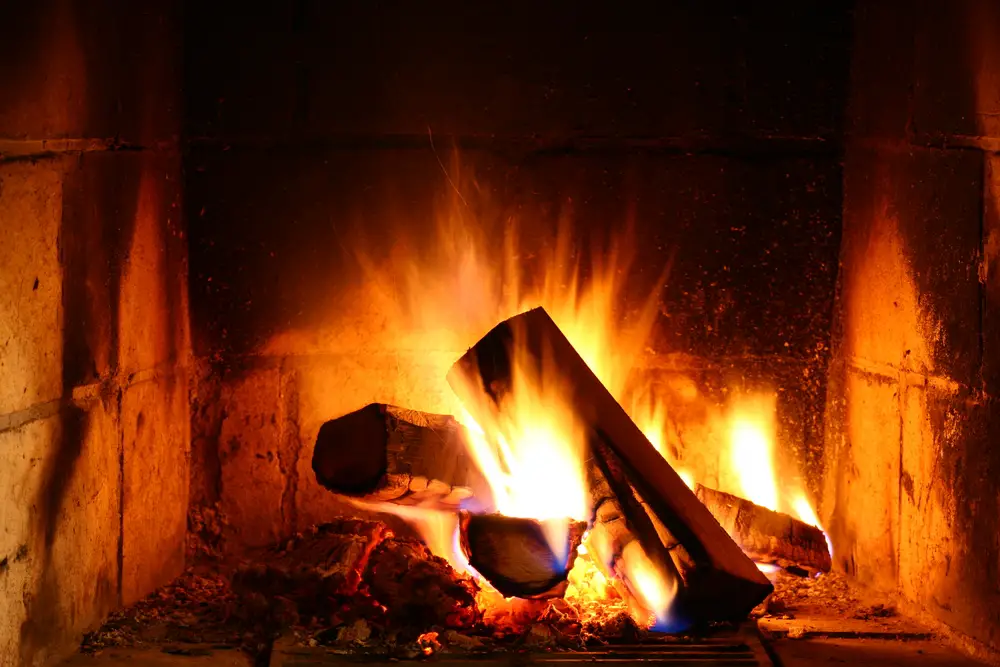Wood-burning stoves may emit an unpleasant smell, posing both a nuisance and potential health hazard, thus necessitating identification and resolution of the root cause for the issue.
Insufficient draught can prevent smoke and moisture from leaving the chimney, causing your wood-burning stove to smell bad. Soot buildup inside the chimney can smell like burnt charcoal. Burning wet wood causes a smell. A new stove being used for the first few times can give off a chemical smell.
Read on if you want to find out more about the possible causes of unusual smells from your wood-burning stove and discover effective solutions to address the issue.

Does a wood burning stove cause your house to smell?
A properly functional wood-burning stove does not cause your house to smell. If there is a problem with your stove, it may be responsible for a wood smoke-like smell in your home.
To some extent, it depends on your perception. You may perceive a slight smell to be unusual while another person may not. However, even a slightly perceptible smell can be a health hazard, so it’s important to take action.
What is the smell like?
The smell emanating from a wood-burning stove is usually pleasant and relaxing, but if the smoke is unusual and unpleasant, something is not okay with the stove.
If your stove is giving off an eggy smell, the wood you are burning probably has a high sulphurous content. Coal also has a high level of sulphur.
A new stove may give off a chemical smell. It happens when the liquids in the paint evaporates and gives off a paint smell—a process known as curing. This smell goes away once you have used the stove a few times. Chemical smell can also emanate when you burn treated wood.
And if your stove is giving off a smell like that of soot, probably there is too much creosote inside the chimney. This smell can also result from burning insufficiently seasoned wood.
If your wood-burning stove smells like soot, the stove probably has a leaky chimney or a negative draught. The problem can also result from a blocked or improperly sized chimney flue. However, these are common issues, and you can address them easily.
Why does my wood-burning stove smell?
There are many possible reasons why your wood-burning stove may give off strange odors. If your stove smells bad, something is wrong with the stove, the way you are using it, or you are burning improperly seasoned wood. Below, we are going to explain the most obvious reasons:
- Partially burned wood: If the wood burned partially, the fire will give off too much smoke, which can lead to an unusual smell. When the fire has insufficient ventilation, wood burns improperly, and at a point the stove may go out.
- Burning wet or polluted wood: Wet wood contains a high level of moisture, and therefore burning wet wood creates too much smoke, soot and creosote that often cause a smell. Burning wood that was exposed to exhaust fumes for long periods of time can also cause a smell.
- Blocked chimney or flue: If the chimney or flue is blocked due to a buildup of soot or creosote inside, smoke will not properly leave your home. Consequently, you may notice a strange smell.
- Sub-optimal operating temperatures: The way you operate your stove can also be responsible for an unpleasant smell. Too small a fire can produce too much smoke, causing a smell. On the other hand, regularly burning too large fires can permanently damage the stove.
- Improper chimney size: A chimney that is undersized for your stove can not remove waste smoke, and that leads to unpleasant smells. The chimney should be taller than the surrounding buildings. Otherwise, downdraughts will occur.
- Reduced airflow: The fire can be starved of oxygen due to insufficiently open vents, leading to the production of excessive smoke. This is one of the common reasons wood-burning stoves cause a smell. When starting a fire, it is important to leave the primary vents open.
- Too much ash: The accumulation of too much ash in a stove leads to reduced airflow, which may be responsible for an unpleasant smell. Also, if left unattended for too long, the ash starts to smell.
- Wet weather: A musty smell can emanate from your stove if the weather is wet. It happens when the creosote or soot deposits in the chimney have excessive moisture. If left untreated, wet creosote can damage your stove.
Apart from the reasons stated above, insufficient ventilation, cold weather, a dead animal trapped inside the flue, or a damaged flue are some other possible reasons your wood burning stove may give off a bad smell.

How long should the Wood burning stove smell last?
As we have stated, a new wood-burning stove initially smells like burnt paint or chemicals. Under the heat, the paints and sealants fully bond with the surface of the stove.
This process, known as curing, leads to a distinct chemical odor. This slight odor goes away once the stove has operated for 5-6 hours. The paint odor abates faster when the stove reaches a temperature of around 700°C. However, coal burns at around 1400°C, and therefore better for curing.
And if the smell results from any of the other issues explained above, the smell should be gone immediately after you’ve successfully resolved the issue. For example, if you are burning wet wood, just start burning properly seasoned wood and you will no longer have to deal with the unpleasant smell.
How to get rid of the wood-burning stove smell
The key is to find out the underlying reason for the smell. If it is a new stove, you will not have to wait long for the paint smell to go away. Just use the stove a few hours and allow curing to take place. Here are ways to prevent or reduce the smell coming from a wood-burning stove:
To begin with, if the chimney has not been cleaned for a while, clean it! You can use a chimney brush to clean the creosote buildup. During the process, keep the stove door closed. The fallen creosote can be easily removed with a wet-dry vacuum.
Wood-burning stoves cause a smell if there are punctures in the chimney and the exhaust piping, so fix them if there are any. Do it when the piping is cool. Detach the screws, remove the section with punctures, and apply wood stove cement into the cracks. The procedure is pretty straightforward, so you can take it as a DIY project if you have time.
Check the gaskets and replace them if they are frayed or worn. Detach the screws, replace the old gasket with a new one, and then reattach the screws. This video nicely shows the procedure.
Prevent rainwater from getting into the chimney by installing a chimney cap. Wood-burning stoves often cause a smell if the home has poor ventilation. So, keep the room well-ventilated.
And most importantly, avoid wet wood like plague! It will make your home smell like wood smoke even if there is no issue with your wood stove. Burn seasoned wood only.
Conclusion
The smell of burning wood can be pleasant, but don’t worry if your wood-burning stove gives off a bad smell; there’s an easy solution. If the stove is new, you do not even have to do anything about the smell. It will go away on its own.
If you can identify the reason behind the smell, in most cases you can address the issue without the help of an expert. Sometimes, the solution is as simple as switching to properly seasoned wood. We hope now you have a better understanding of the problem and its solutions.
